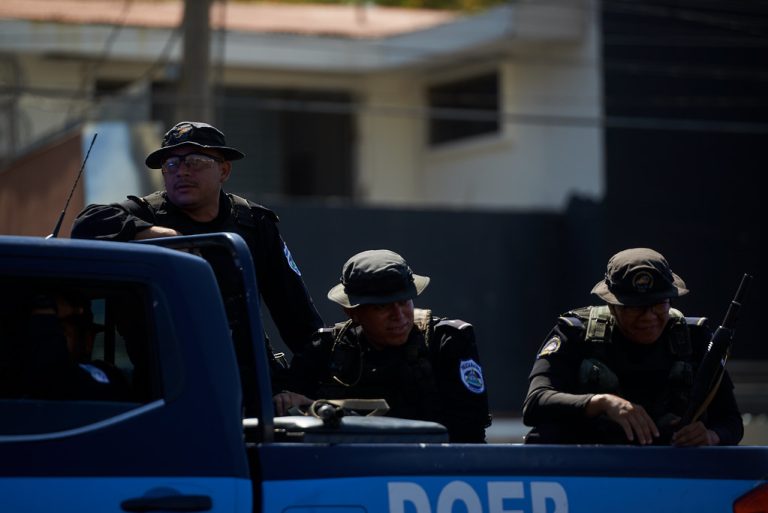23 de mayo 2023

The Return of the Military

PUBLICIDAD 1M
PUBLICIDAD 4D
PUBLICIDAD 5D
More than 50 Nicaraguans charged with political crimes are living with the uncertainty of losing their parole at any time.

The Police are keeping watch of opposition members’ homes. Photo: Confidencial
“Luis” left his home a few days before the Police came to transfer him to Managua and Ortega-supporting judges charged him – in a trial in absentia – with the catch-all crimes of “undermining national integrity” and “spreading fake news.” His initial plan was to hide away somewhere in Nicaragua, but when he discovered there was a court case against him, he sought exile in Costa Rica.
“The first day I left, I didn’t have a clue about anything. I didn’t know where to go,” he says, taking the pseudonym “Luis” to protect himself. A friend helped him to move within Nicaragua. He’d decided to travel to Honduras, but on the way there, he thought traveling to Costa Rica would be a better choice. So, that’s what he did. He took refuge in a Pacific area of Nicaragua for a week, planning his journey to cross over illegally to stop any chance of him being arrested and sent to jail.
It was a week of total uncertainty, mainly after the indictment came. According to the Criminal Procedure Act, a defendant has the right “not to be judged in abstentia, unless they flee once the trial has commenced,” which wasn’t “Luis’” case. Yet, the machine of Ortega’s judges clearly violated the Law and proceeded to hold a summary hearing against him, which dozens of citizens captured on May 3rd were also subjected to, who were then placed on probation.
“Luis” believes an arrest warrant for him would have made sense if he didn’t show up to the trial. He says that they wouldn’t have let him go home on parole, like the rest, who are forced to sign in at police stations every day. The reason he’s so sure about this is because he had already been threatened in two previous arrests, in 2022.
The last time he was kidnapped, for approximately six hours, he was warned that if he didn’t stop his activism, they would transfer him to the infamous El Chipote jail, where human rights activists have documented the torture of political prisoners.
In the past two months, the Ortega regime has carried out several roundups. The first took place within the scope of the fifth anniversary of the April 2018 civic uprising, and resulted in thirty-something citizens being sent to prison, isolated and with zero access to court records.
The other large group, of over 50, were abducted over two weekends, and are facing trial are on parole until their trials. In both cases, human rights activists and analysts, have pointed out that Ortega is looking to spread fear in Nicaragua and crush any kind of civil resistance, forcing the latter into exile. That’s what happened to “Luis”.
“Luis” didn’t want to go into exile, because he’d already done that in the 1980s. He was a child back then. “I always said that I was going to hold out in Nicaragua,” he says. However, when political surveillance of his home and family was turned up, and charges were brought against him, he knew he had to leave or get ready to go to jail.
His family told him: “we prefer to have you further away, outside the country, but safe, free, than be held prisoner, especially because you haven’t committed a crime. Thinking differenty isn’t a crime.” So, everyobody knew that when the time came, “Luis” would leave. Exile is “super tough, separating yourself from your family and the comforts you have at home,” he says.
On his departure to Costa Rica, “Luis” ran into Army members, who had captured opposition members in the past. He felt that the stretch to get to them was “never-ending”, but he placed his trust in God and he managed to get out free. The soldiers checked his documents and let him cross over.
Once outside Nicaragua, he experienced what many of the over 500,000 Nicaraguans who have gone into exile since 2018 up until now, have said they’ve experienced: relief, but also sadness.
“You feel relieved on the one hand, because you are somewhere where you can sleep peacefully. I don’t feel like I’m being watched, or persecuted,” but you have mixed feelings, “because you leave your life behind, you leave your people, your home behind, and you don’t know when you can ever go back, if you’ll ever see all the people you left behind again,” he says.
He lives with a solidary family in Costa Rica, and he follows the crisis in Nicaragua. He says that the opposition need to unite so that everyone like him who were forced to leave their country, can come back as soon as possible.
From “Luis” the activist’s point of view, the regime’s strategy is a test, to assess just how far they can “keep the Nicaraguan people submissive and quiet,” as they know there are people resisting in the country.But they are also sending a message to their own ranks, that anyone who questions their decisions could face jail, like we’ve already seen.
This article was originally published in Spanish in Confidencial and translated by Havana Times
PUBLICIDAD 3M
Confidencial es un diario digital nicaragüense, de formato multimedia, fundado por Carlos F. Chamorro en junio de 1996. Inició como un semanario impreso y hoy es un medio de referencia regional con información, análisis, entrevistas, perfiles, reportajes e investigaciones sobre Nicaragua, informando desde el exilio por la persecución política de la dictadura de Daniel Ortega y Rosario Murillo.
PUBLICIDAD 3D